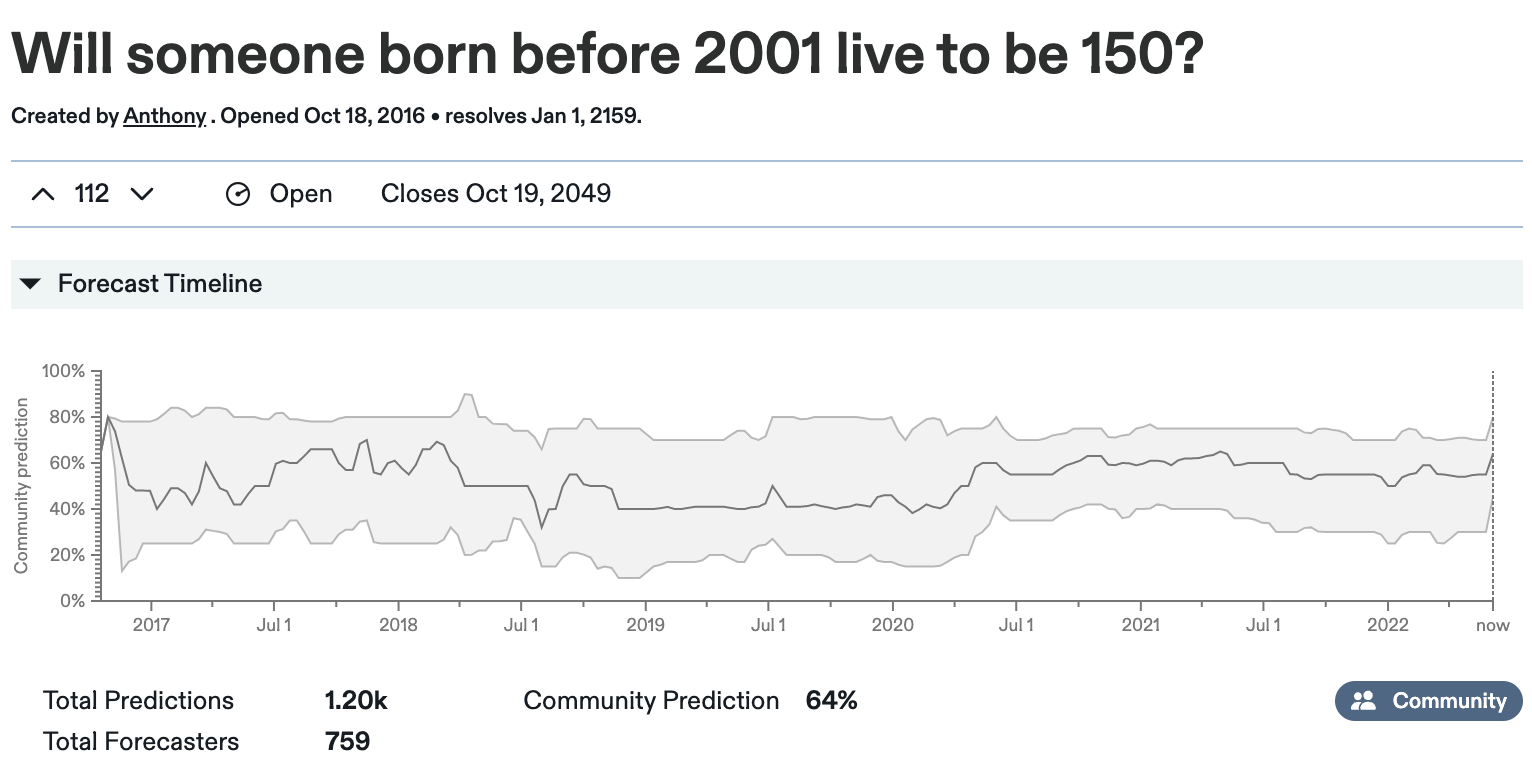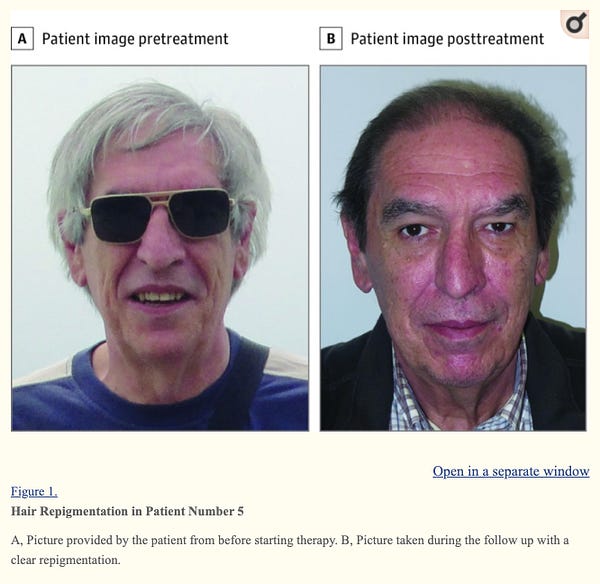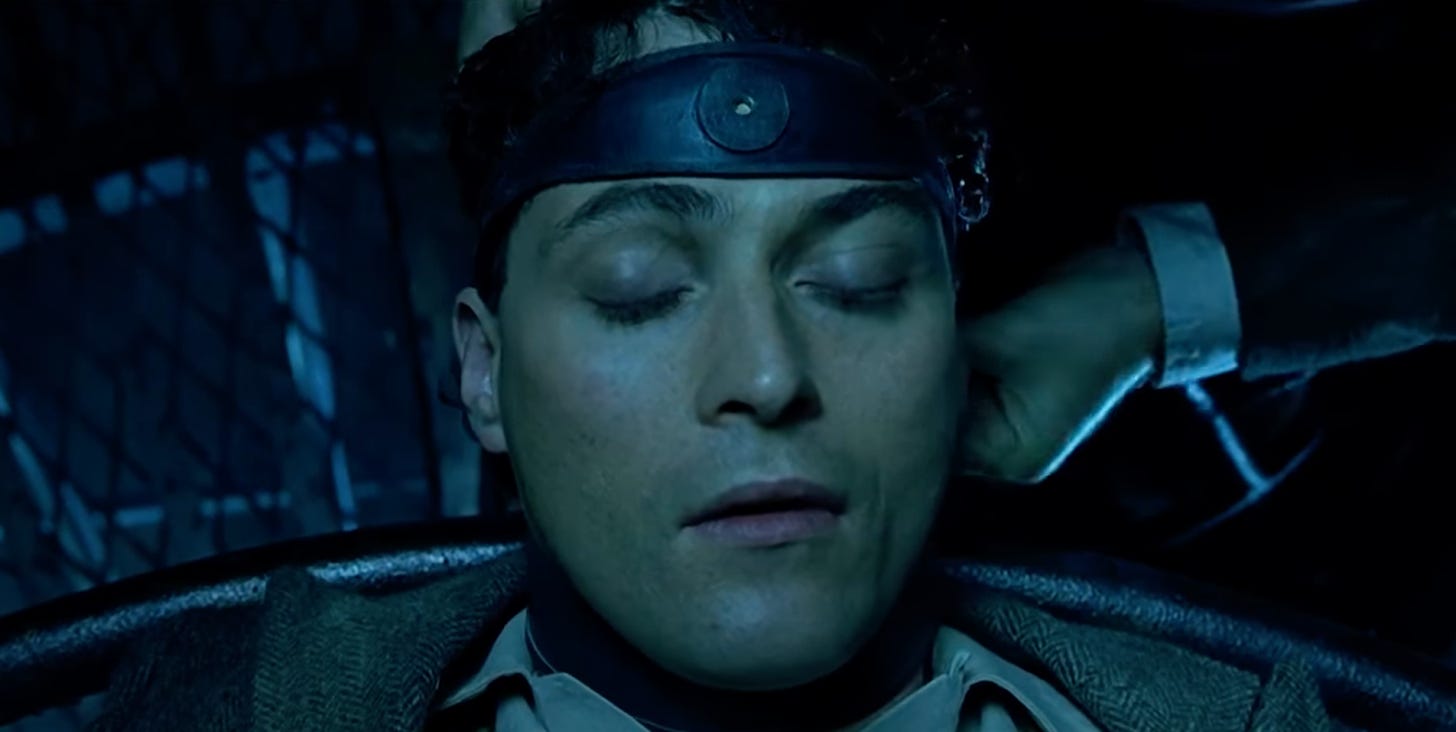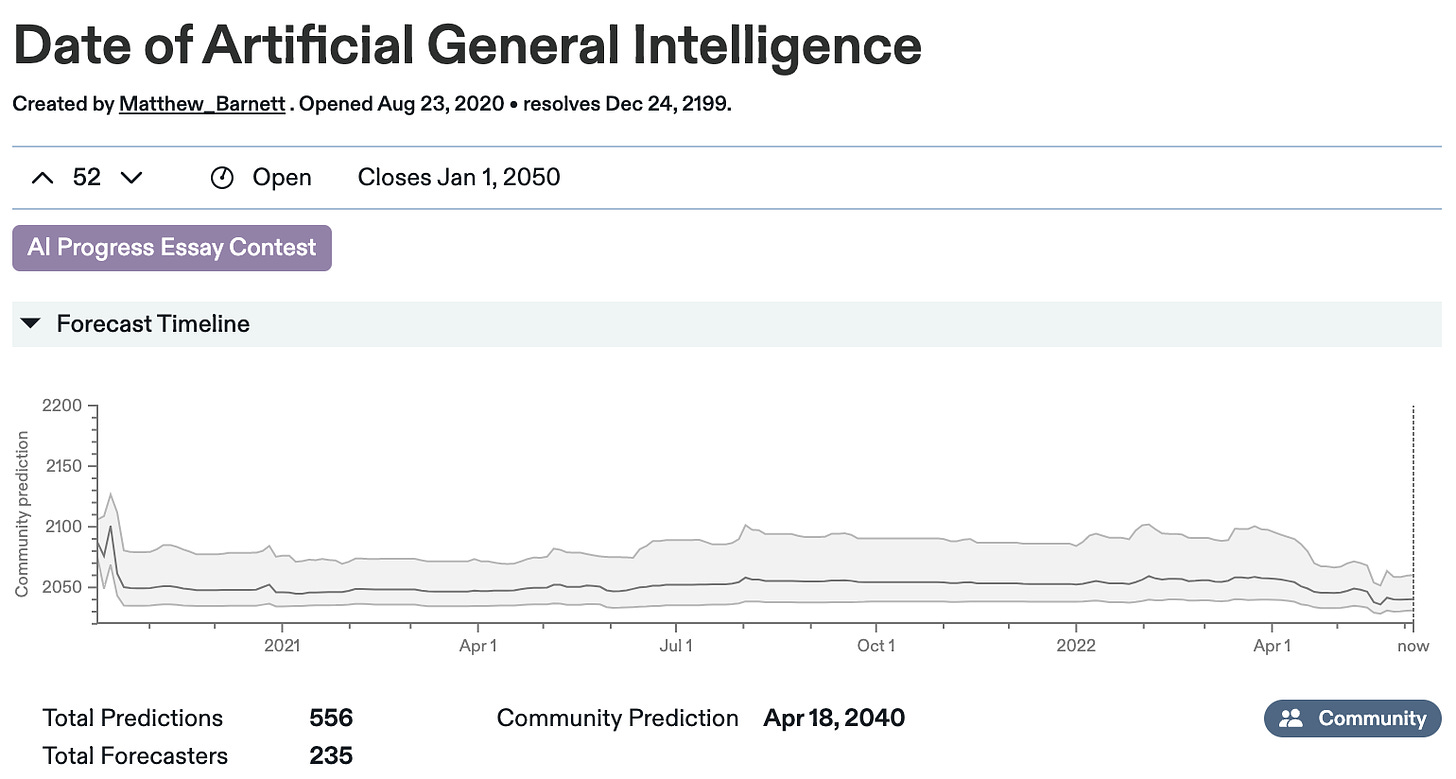We’re either the last generation to ever die, or the first generation to live forever.1
I’m not talking figuratively here, through your legacy or by getting your name in Wikipedia. I’m talking about actually experiencing life forever in good health. Here are the four ways this might happen:
1. Stop Aging—Or Even Rejuvenate
We can already slow down aging. Research is going so fast that, in the last few years, we’ve been able to better understand and quantify the improvements in lifespan and health from dozens of behavioral factors, including food, exercise, heat, cold, and many others. I will write about these soon.
These improvements can give you years, even decades more of life. They’re no joke.
Thankfully, the research is not limited to leading a perfect life devoid of any pleasure. We understand better and better the mechanisms of aging, from the role of epigenetics to the potential of using Yamanaka factors. That is providing us some hints at molecules that might increase our lifespan, such as metformin or NMN. I will write another article about these.
At the speed of current development, it’s very possible that In the coming decades we will reach the moment when we stop aging completely. Once aging stops, those of us alive—even if we’re very old—could remain at that age until science figures out how to reverse aging.
We might live forever.
If you think this is preposterous, realize that today the prediction market believes there’s a 64% chance that somebody born before 2001 will live to be 150!

We can already turn back the aging clock on mice. We can even turn around human age biomarkers: people whose biomarkers suggest they’re 60 years old appear to be 30 after some treatments.


Billionaires like Amazon’s Bezos and Google’s Page and Brin are pouring billions into this. Hopefully, we’ll get there in a few decades.
Still skeptical? Curious about how you can slow down aging today? Stay tuned for my article on the topic in the coming weeks.
2. Upload Your Mind
If you don’t make it physically to the year when people live forever, maybe soon you’ll be able to upload your mind to the Internet instead?
The idea is that neurons, their connections, and any factor that determines their behavior could be scanned and copied into a computer. Once we understand how to do that, we could have an exact copy of a functioning brain, but in software instead of hardware.
We’re not there yet. Our knowledge of the brain and how it works is medieval. However, we might not need to understand how the brain works to be able to rebuild it. As long as we figure out how to replicate its infrastructure, your consciousness should come along2. Since consciousness emerges from the physical brain, copying the brain into software would regenerate the consciousness inside a computer3.
If you’re curious what that could look like, pop culture is exploring this concept through shows like Black Mirror, Upload, or Altered Carbon.
If the concept of uploading your mind terrifies you because That’s not me! That’s some software that just remembers to be me! maybe consider this: If every time you go to sleep at night you die, and a new body replaces you in the morning, loaded with your memories, there is no way you could tell this is happening. This would be like going to sleep at night and waking up in a digital world.

When does the community believe this will happen?
Around 2076. Understandable: we first need to be able to understand the structure of the brain, then to scan it, and then to replicate it in software. Not easy. Still plenty of work to do. In my case, I’m not sure this will be for me. I’d need to be nearly 100 years old to make it to that time. I’d also need to part ways with my body, but I kind of like it. Maybe I won’t say the same thing if I live to 100, at which point aging technology might not have advanced enough to keep me young, and I might be willing to jump ship into a more agile software version of myself. In any case, this is better than dying and disappearing forever, but it’s not my favorite way to live forever. Do we have something better?
3. Cryonics
Maybe you’re too old for aging research to catch up with you, or for technology to advance enough to get your mind uploaded. Maybe you have a terminal illness. Or maybe you’re young and healthy, but aging and mind uploading research will just be too slow for you. You have a wild card.
Cryonics is the process of “freezing” your body (or head) in a way that preserves its integrity, with the hope of being thawed later and coming back to life. If you freeze now, you can wait for rejuvenation technology to develop by the time you’re thawed.
Skeptics have concerns about this, but as Tim Urban explains in Why Cryonics Makes Sense—which you should read if you’re interested in the topic—most of them are not great:
The main concern is that we can’t thaw frozen bodies. That’s true but irrelevant. We don’t need to know how to do that. Only to freeze bodies in a way that doesn’t lose information. Then we can wait, frozen, for good thawing technology to come around—100 years, 1,000 years if you need to.
If the process of freezing or vitrification4 destroys the tissues, enough information about your brain might be lost that even proper thawing might not be good enough. But we can already thaw vitrified animal organs and human tissues and keep them functional. The ability to eventually expand this to whole human bodies seems reasonable. Some skeptics think that conserving the brain structure intact might be impossible. Even if it is, it might not be needed: In the future, we might be able to find the signals in the tissue to reverse engineer what the brain looked like before thawing, the same way we can reverse engineer what animals looked like in the past with a few remaining bones.
Companies that freeze you might disappear, and your body might be thawed and disposed of against your will. This is the biggest risk. But the funding for your cryopreservation includes an endowment to pay for your ongoing costs. Hopefully, regulation will appear in the coming years to prevent this from happening, or the market will expand enough to make these companies viable forever. But even if the likelihood of disposal is 90%, there would still be a 10% shot at eternal life.
What’s the likelihood that cryonics work—that if you get frozen now, you can thaw successfully? Depending on the Metaculus question you reference, odds are between 3% and 6%, but the community thinks those frozen by 2055 are much more likely to survive.
The cost is usually between $25k and $200k, or less than $30-$100 per month for those who get insurance. That makes this accessible to a majority of people. The lower bound of $25k is for people who might only want to cryopreserve their heads. This works assuming that these heads would be thawed later, once technology is sufficiently advanced to create bodies that the head can be attached to.
$25k at a 5% chance means you could buy eternal life for $500k5. Today. Sounds like a good deal.
4. The AI Singularity
The technological singularity is when artificial intelligence becomes intelligent enough—which is called Artificial General Intelligence, or AGI—that it can improve itself constantly. The more it improves itself, the more intelligent it becomes, and the faster it improves itself, and the more intelligent it becomes, in a virtuous cycle that makes it intelligent like a god. This process would accelerate over time, since a more intelligent AI can figure out ways to improve its data, energy, and processing power.
Tim Urban puts it this way in his fabulous blog WaitButWhy:
And explains it more scientifically this way:
It is believed that this runaway process, called Intelligence Explosion, will either kill us all—if the AI’s interests are not aligned with ours—or get us an AI that is so vastly more intelligent than humans that it could solve trivially any problem we haven’t been able to solve yet. Including reversing aging, freezing humans to properly conserve them, thaw them, cure us of any disease, or upload us to the Internet. So this could really be the nuclear option of eternal life.
So when will that happen? Well, according to Metaculus, a weak version of this would happen as soon as 2029, and a stronger version of this by 2040.

The famous Ray Kurzweil, author of The Singularity Is Near, put the singularity around 2045.
If any of these predictions is true, very soon after the singularity, we will be either dead or reach eternal life.
That means that if you survive the next 20-40 years, you might live forever.
In fact, you might not even need to survive 20 years. If you freeze yourself now and the singularity happens in 20 years, odds are very high that the AGI will figure out a way to thaw you and reconstruct any part of your brain that might have decayed during the freezing process, as long as the information about the previous state of your brain has not completely disappeared.
If you freeze yourself today, you might reach eternal life in a few decades while you sleep.
It’s worth a shot.
This leaves a couple of questions:
Should we live forever? What would happen if we never die?
How can you increase the odds of making it to that date? How can we slow down aging today?
I’ll cover the first in this week’s premium article, and the 2nd in next week’s.
Inspired by Jason Crawford’s quote: “We who are alive today could either be the first immortal generation—or the last mortal one.” Source.
This is not an argument that many people are acquainted with, so it’s worth dwelling on it a bit. Your thoughts and your consciousness emerge from the brain in a way that we don’t understand well yet. But at the end of the day, our brains are an information management device, which gets information from its senses, processes it, and out of it comes thoughts and behaviors. If you are able to know exactly how it processes information, and replicate that process exactly, you might not even need to understand it. The field of AI has the same debate today. Some people think that the most advanced AIs today are fundamentally dumb: they will need a different architecture to become intelligent like humans. Others believe that’s not necessary. Maybe they are simply not big enough.
We don’t need to understand how the consciousness works either in order to replicate it. If it emerges from the brain’s structure, replicating the brain’s structure should make consciousness emerge too.
It’s like freezing, but with a special process that doesn’t create crystals, and hence doesn’t break cells.
It’s what’s called expected value in probabilities. For example, if a lottery ticket costs $25k and has a 5% chance of getting you the prize, it’s as if you were spending $500k to get the prize. A risk-neutral person would buy that lottery ticket if they valued the prize above $500k. That’s why I’m saying it’s like valuing life at $500k.









Some of the folks that are best known for longevity research are more interested in publicity than moving science forward. Unfortunately, they are not necessarily the best examples of work being done to achieve age reversal, which is no longer on the wish list, but has been done in several cases that are still secret due to intellectual property considerations. I have seen lab mice with an average life of two years live beyond five years at present with no sign of aging and those that were in bad shape prior to this innovative technology have de-aged within months of the first treatment. This is not pie in the sky technology, but here and within the next decade it will be available assuming that the ethical and legal issues can be dealt with. Aging is a complicated problem that is not just about the length of life, but the quality as well. It also involves what impact it will have on a wide range of issues that include bioethics. In other words, it's more complicated than turning an 80-year-old into a 40-year-old, hair grown back, healthy and vigorous with some signs of disease that have simply gone away. It is a bit like UFO's. You find it impossible to believe it until you see it with your own eyes. And even then, as a skeptic, you want to still see it as impossible, but it isn't. This is real, at least for five year old lab mice, and a few elderly folks that have chosen to be human lab rats that when you see the before and after (in person), you still have to ask yourself, is this really possible. It defies belief, but we are already there.
I will most likely be asked when we can see this available in general use, but I can't possibly give any timeframe due to the other issues that surround the de-aging prooces that are not tied to the physiological aspects, but it would not surprise me to see this offering in limited numbers within five to ten years. But believe me, I have seen it with my own eyes and it is a stunning reversal that is now over two and a half years from when I was able to see it for myself.
We have so much to look forward to, and as a 73-year-old, I strongly believe I have a chance at living to a healthy and vigorous 125-150 years of age. I certainly hope that will turn out to be the case!
Curious to see such resistance to the prospect of dramatically extending life expectancy in the comments. I'd love to see these technologies materialize, although, having played SOMA, I won't be an early adopter. Interesting read, Tomas. Thanks for putting this together.